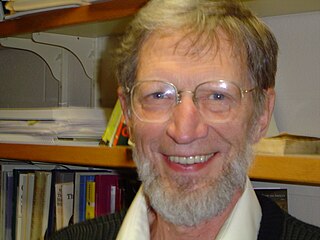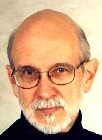
Alvin Carl Plantinga is an American analytic philosopher who works primarily in the fields of philosophy of religion, epistemology, and logic.

Theistic evolution, alternatively called evolutionary creationism, is a view that God acts and creates through laws of nature. Here, God is taken as the primary cause while natural causes are secondary, positing that the concept of God and religious beliefs are compatible with the findings of modern science, including evolution. Theistic evolution is not in itself a scientific theory, but includes a range of views about how science relates to religious beliefs and the extent to which God intervenes. It rejects the strict creationist doctrines of special creation, but can include beliefs such as creation of the human soul. Modern theistic evolution accepts the general scientific consensus on the age of the Earth, the age of the universe, the Big Bang, the origin of the Solar System, the origin of life, and evolution.
Internet Infidels, Inc. is an American nonprofit educational organization founded in 1995 by Jeffery Jay Lowder and Brett Lemoine. Its mission is to use the Internet to promote a view that supernatural forces or entities do not exist. Internet Infidels maintains a website of educational resources about agnosticism, atheism, freethought, humanism, secularism, and other nontheistic viewpoints particularly relevant to nonbelievers and skeptics of the paranormal. Relevant resources include rebuttals to arguments made by religious apologists and theistic philosophers, transcripts of debates between believers and nonbelievers, and responses from opponents of a naturalistic worldview. The site has been referred to by one of its critics, Christian apologist Gary Habermas, as "one of the Internet's main Web sites for skeptics", and by skeptical physicist Taner Edis as "a major Web site serving nonbelievers". Its tagline is "a drop of reason in a pool of confusion".

In the philosophy of religion, Reformed epistemology is a school of philosophical thought concerning the nature of knowledge (epistemology) as it applies to religious beliefs. The central proposition of Reformed epistemology is that beliefs can be justified by more than evidence alone, contrary to the positions of evidentialism, which argues that while non-evidential belief may be beneficial, it violates some epistemic duty. Central to Reformed epistemology is the proposition that belief in God may be "properly basic" and not need to be inferred from other truths to be rationally warranted. William Lane Craig describes Reformed epistemology as "One of the most significant developments in contemporary religious epistemology ... which directly assaults the evidentialist construal of rationality."
Theistic science, also referred to as theistic realism, is the pseudoscientific proposal that the central scientific method of requiring testability, known as methodological naturalism, should be replaced by a philosophy of science that allows occasional supernatural explanations which are inherently untestable. Proponents propose supernatural explanations for topics raised by their theology, in particular evolution.

Religious naturalism is a framework for religious orientation in which a naturalist worldview is used to respond to types of questions and aspirations that are parts of many religions. It has been described as "a perspective that finds religious meaning in the natural world."
Natural religion most frequently means the "religion of nature", in which God, the soul, spirits, and all objects of the supernatural are considered as part of nature and not separate from it. Conversely, it is also used in philosophy to describe some aspects of religion that are said to be knowable apart from divine revelation through logic and reason alone, for example, the existence of the unmoved Mover, the first cause of the universe.
Deistic evolution is a position in the origins debate which involves accepting the scientific evidence for evolution and age of the universe whilst advocating the view that a Deistic God created the universe but has not interfered since. The position is a counterpoint to theistic evolution and is endorsed by those who believe in Deism, and accept the scientific consensus on evolution. Various views on Deistic evolution:
Metaphysical naturalism is a philosophical worldview which holds that there is nothing but natural elements, principles, and relations of the kind studied by the natural sciences. Methodological naturalism is a philosophical basis for science, for which metaphysical naturalism provides only one possible ontological foundation. Broadly, the corresponding theological perspective is religious naturalism or spiritual naturalism. More specifically, metaphysical naturalism rejects the supernatural concepts and explanations that are part of many religions.
In the history of religion and philosophy, deus otiosus is the belief in a creator God who has entirely withdrawn from governing the universe after creating it or is no longer involved in its daily operation. In Western philosophy the concept of deus otiosus has been associated with Deism since the 17th century, although not a core tenet as often thought.

Ursula W. Goodenough is a retired Professor of Biology Emerita at Washington University in St. Louis, where she researched on eukaryotic algae. She authored the textbook Genetics and the best-selling book The Sacred Depths of Nature and speaks regularly about religious naturalist orientation and evolution. She contributed to the NPR blog 13.7: Cosmos & Culture from 2009 to 2011.
In social, cultural, and religious studies in the United States, the "epic of evolution" is a narrative that blends religious and scientific views of cosmic, biological, and sociocultural evolution in a mythological manner. According to The Encyclopedia of Religion and Nature, an "epic of evolution" encompasses
the 14 billion year narrative of cosmic, planetary, life, and cultural evolution—told in sacred ways. Not only does it bridge mainstream science and a diversity of religious traditions; if skillfully told, it makes the science story memorable and deeply meaningful, while enriching one's religious faith or secular outlook.

Philip Hefner was an American theologian. He was professor emeritus of systematic theology at the Lutheran School of Theology at Chicago.

Jerome A. Stone is an American author, philosopher, Congregationalist minister, and theologian. He is best known for helping to develop the religious movement of religious naturalism. Stone is on the Adjunct Faculty of Meadville Lombard Theological School; is Emeritus Professor of Philosophy at William Rainey Harper College; is in Preliminary Fellowship with the Unitarian Universalist Association; and is a member of the Highlands Institute of American Religious and Philosophical Thought and the Institute on Religion in an Age of Science (IRAS).

Spiritual naturalism, or naturalistic spirituality combines a naturalist philosophy with spirituality. Spiritual naturalism may have first been proposed by Joris-Karl Huysmans in 1895 in his book En Route.
Coming into prominence as a writer during the 1870s, Huysmans quickly established himself among a rising group of writers, the so-called Naturalist school, of whom Émile Zola was the acknowledged head...With Là-bas (1891), a novel which reflected the aesthetics of the spiritualist revival and the contemporary interest in the occult, Huysmans formulated for the first time an aesthetic theory which sought to synthesize the mundane and the transcendent: "spiritual Naturalism".

Donald Allen Crosby is an American theologian who is professor emeritus of philosophy at Colorado State University, since January 2000. Crosby's interests focus on metaphysics, American pragmatism, philosophy of nature, existentialism, and philosophy of religion. He is a member of the Highlands Institute of American Religious and Philosophical Thought and has been a leader in the discussions on Religious Naturalism.
Willem Bernard "Wim" Drees is a Dutch philosopher. As of the 1st of November 2014 he is professor of philosophy of the humanities at Tilburg University in the Netherlands. From 2008 until 2018 he was the editor-in-chief of Zygon, Journal of Religion & Science and professor of philosophy of religion at Leiden University, the Netherlands.
Although biological evolution has been vocally opposed by some religious groups, many other groups accept the scientific position, sometimes with additions to allow for theological considerations. The positions of such groups are described by terms including "theistic evolution", "theistic evolutionism" or "evolutionary creation". Of all the religious groups included on the chart, Buddhists are the most accepting of evolution. Theistic evolutionists believe that there is a God, that God is the creator of the material universe and all life within, and that biological evolution is a natural process within that creation. Evolution, according to this view, is simply a tool that God employed to develop human life. According to the American Scientific Affiliation, a Christian organization of scientists:
A theory of theistic evolution (TE) — also called evolutionary creation — proposes that God's method of creation was to cleverly design a universe in which everything would naturally evolve. Usually the "evolution" in "theistic evolution" means Total Evolution — astronomical evolution and geological evolution plus chemical evolution and biological evolution — but it can refer only to biological evolution.

In philosophy, naturalism is the idea that only natural laws and forces operate in the universe. In its primary sense, it is also known as ontological naturalism, metaphysical naturalism, pure naturalism, philosophical naturalism and antisupernaturalism. "Ontological" refers to ontology, the philosophical study of what exists. Philosophers often treat naturalism as equivalent to materialism, but there are important distinctions between the philosophies.
Theistic naturalism is a theologically-based belief system within philosophy which rejects divine intervention but maintains theism.










